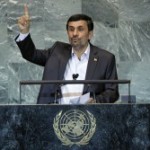Tuesday’s shocking mob assault on the British Embassy in Tehran was ultimately broken up by the Iranian authorities, but certainly looked like a government-planned protest. The same authorities also claim an explosion in a city housing part of their nuclear program never happened—despite it being a semi-official Iranian agency that previously reported it. These instances raise serious questions about Iran’s trustworthiness or lack thereof. But the incidents are linked for another reason as well.
Clearly the conflict between Iran and the West has gotten well past official statements and military threats. The purported explosion in Isfahan on Monday, which Haaretz said was reported by the Iranian Fars News Agency, was later denied by the Iranian media and officials. Considering the fact that Isfahan hosts a uranium conversion facility in the Iranian nuclear program, one has to wonder how significant the blow was—assuming it actually happened.
Fox News Channel did say that at one point neither the US Pentagon nor the International Atomic Energy Agency had reports on an explosion in Isfahan, although Haaretz depicted a photograph of black smoke from Fars’ original story on the explosion.
Just recently an explosion in another area of Iran killed a key official in their missile program, and that event did get some coverage from the Iranian media. The contradictory reports on the Isfahan explosion are intriguing: At the very least, the Iranian media is getting jumpy and explosion reports are readily believable.
It’s telling that one day later hundreds of Iranians stormed the British Embassy. The incident recalled the embassy hostage crisis in 1979, when United States diplomatic personnel were held captive for 444 days after the outbreak of the Iranian revolution.
The British and Iran have seen diplomatic relations drop in recent days, as the UK had previously applied new sanctions on Iran along with the US. And now the Fars News Agency is reporting that Iranian students are demanding ties be cut between Iran and the UK. Fars quoted a statement from the protesting students as saying the sanctions on the Central Bank of Iran were “synonymous with declaring war on the Iranian nation.”
There’s little doubt the Iranian authorities are behind the embassy attack, despite the efforts by the police to end it. A government-sanctioned ransacking of the embassy would have led to potentially disastrous diplomatic repercussions for Tehran—now they have plausible deniability.
But nothing really happens in Iran unless the regime allows it. The vicious crackdown on the Green Movement protests proves the authorities hold the power. Furthermore, the embassy attack compares closely to the Iranian embassy assault in 1979, as well as more recent embassy violence in Syria. The Bashar al-Assad regime in Damascus has also tried the intimidation through embassy approach, with mixed results. Ironically, it also probably contributed to the regime’s further international and inter-Arab isolation.
The UK certainly is holding the Iranian government responsible, regardless of who is to blame. A statement from UK Foreign Secretary William Hague posted on the UK Foreign and Commonwealth Office website, said that he spoke with the Iranian foreign minister. “While he said that he was sorry for what had happened and that action would be taken in response, this remains a very serious failure by the Iranian Government,” said Hague.
He later threatened that “Clearly there will be other, further, and serious consequences” following the embassy attack.
Despite the questionable practical wisdom in attacking the British embassy, it appears Iran is sending a message. And that’s where the link to the Isfahan explosion and the previous Iran blast comes into play.
The latest boom wasn’t claimed by the US, Europe or Israel. Officially, neither was the last explosion that hit the Iranian missile program. But the sabotage efforts seeking to undermine the Iranian nuclear program, which has reportedly included assassinations of Iranian nuclear scientists, seems to be stepping up a notch.
These aren’t drive-by shootings or a sophisticated cyber-attack. These explosions look to be serious sabotage attempts. Could more blasts at other Iranian nuclear cities be forthcoming? Is the cold war between Iran and the West heating up?
It looks that Iran thinks so. That’s why the embassy protest wasn’t just a thousand students chanting. The storming of the embassy sends a severe message from the Ayatollahs in Tehran: We can escalate too.
If the sabotage continues, and there’s no reason why it shouldn’t, we can expect more antics from the Iranians. They are accused of seeking to assassinate the Saudi ambassador in the US already. Could terror attacks from Hezbollah in Lebanon be next? Iranian-backed terrorism reaches farther than its success would indicate.
The good news is that the embassy assault in Tehran implies that the Iranian regime is actually feeling some heat. If the sabotage and sanctions weren’t causing concerns as to Iran’s push for the bomb, the escalation at the embassy wouldn’t have been worth it. As it is, Europeans are outraged—and the diplomatic risk was even higher, as the situation could have been even worse.
So it’s time to keep the pressure up on Iran and even increase it. Just keep in mind embassy security should be increased as well.
(By Joshua Spurlock, www.themideastupdate.com, November 29, 2011)

